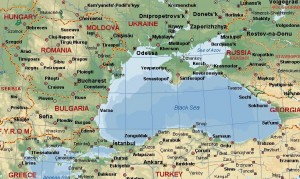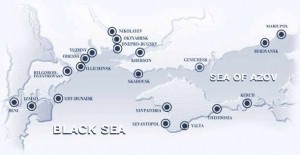2014-11-19 By Risk Intelligence
The Black Sea region has in the past 12 months been dominating maritime and political media reporting.

There have been key political issues in the Ukraine and in Turkey.
There has been as well the re-emergence of Russian military ambitions in the Eastern Ukraine and the Crimea.
In addition, there has been the terrorism threat against the Islamic State (IS) that is currently dictating Western military operations in Syria and Iraq, which also gives the potential for Turkey to become embroiled in a conflict that could further draw NATO into a potential major conflict on the borders of Europe.
There are varying maritime issues that are currently affecting the countries in the region.
They vary considerably, but in most cases they are inter-linked, and what affects one country is likely to be felt in a neighboring country also….
Ukraine
The primary issue in the Ukraine is the widely reported conflict between the government in Kiev and those wishing to be linked to Russia in the east of the country.
The pro-Russian militia groups in the east and pro-EU politicians and the military in the west of the country are currently at an impasse and there does not appear to be an avenue to guarantee peace in the country.
Where overtures of peace are made on one day, these are normally negated in further conflict and violence on the next.
The Russian annexation of the Crimea will dominate Ukraine political and military doctrine for some time and also help to dictate UN, US and EU foreign policy for the coming 12 months at least.
Russian control of the Crimea and the continuing EU and US economic sanctions have reduced maritime trade into Ukrainian ports by in some cases as much as 60% and possibly higher in some ports.
Security at Ukraine ports is currently suspect and under scrutiny would be liable to fail to meet EU expected levels.
Georgia
There are still some legacy issues that remain from the limited conflict with Russia and the disputed Abkhazia region on the shores of the Black Sea.
There is currently a peaceful rapprochement between Russia and Georgia and the potential for further violence is currently low, despite the support that Georgia has shown to the Ukraine.
However, security is in general good at ports, although organized crime and narcotics movements are higher than the regional average.
Romania and Bulgaria
There are no significant maritime security issues affecting these two countries.
They are both new members of the EU, and port security has been raised to meet EU regulations.
There is still some significant issues regarding cargo theft, but this mainly occurs outside of the port areas.
Russia
Notwithstanding the issues regarding the annexation of the Crimea, and the conflict in Ukraine, Russia faces a serious threat of Islamic terrorism from Chechen based groups.
Port security at all Russian ports is high, but crime in ports is still higher than would be expected despite the security.
Russia is still one of the largest arms exporters in the world and a considerable amount of weapons and military cargo is shipped from Russian ports in the Black Sea.
There is a large amount of this cargo that is legitimate, but there have been several incidences of weapons that are unaccounted for or misrepresented on cargo manifests.
Turkey
With the exception of some internal political disputes, Turkey’s main security issue is the continued spread and strength of the IS, which now controls large areas of Iraq and Syria close to and on the border of Turkey.
They have yet to engage the Turkish military, and despite the involvement of US and EU nations in fighting the IS, the Turkish military has yet to become substantially involved.
The Turkish control the Bosphorus and Dardanelles, linking all the maritime traffic to and from the Mediterranean and the Black Sea, gives the country some considerable control over the maritime domain in the region.
Notwithstanding this control, over 80% of maritime traffic remains indigenous to the Black Sea, and thus does not fall under the scrutiny and control of the Turkish government agency (Turkish Straits Vessel Traffic Service (TSVTS)) which is responsible for the waterway.
However, there are still on average nearly 50,000 vessel transits every year.
The Challenges
As should be expected, maritime trade is an essential element in the Black Sea economic foundation.
There are a lot of ports on the shores of the Black Sea, some are large and important cargo hubs, and cater for a wide variety and type of vessel.
Of all the countries in the region, the Ukraine possesses the largest port potential in the Black Sea.
Turkey has the largest maritime border in the Black Sea, but many of its major ports are situated on its Mediterranean coast.
The most influential maritime country is Russia.
Its military capability and trading capacity makes its ports significant, in terms of economic and vessel handling capacity.
Of the other countries, Bulgaria, Romania and Georgia have only Black Sea access for maritime traffic, although Bulgaria and Romania also rely heavily on maritime traffic along the Danube River and the canals and waterways of Europe…..
The Black Sea region has become the focus of maritime security for a variety of reasons during the last few years.
There are legacy issues regarding security in Georgia, there are long-term problems that will be experienced in the Ukraine and the Crimea. Russia is fighting a continuing war against extremists in Chechnya and the wider Caucuses. They have targeted the city of Volgograd in 2013 and they could also target other ports and important cities on the Black Sea.
The city of Sochi, host for the Winter Olympics and now a venue on the motor racing circuit, would be an iconic target for terrorists.

Turkey has the threat of the war in Syria and the advancement of Islamic State in Iraq on its doorstep.
There is then the overlay of narcotics and weapons smuggling, human trafficking and irregular migration.
Regional governments do not always have a central focus on joint security, but within the Black Sea, all the countries can assist in maintaining the level of control and security that the region needs.
Turkey would appear to hold the trump cards owing to its control of the Dardanelles and the Bosporus, but will need to be conscious of the growing threat from IS and the movement of refugees from the conflict areas of Iraq and Syria.
Russia continues to suffer from the legacy of independence demands from the Caucuses and from former countries that made up the Soviet Union.
The issues surrounding the Ukraine will be felt for some considerable time, and the annexation of the Crimea and Russia’s involvement in the east of the Ukraine will be met with strong rhetoric and economic sanctions.
The issues of the Ukraine will not be decided in the short term, and so maritime trade will be greatly affected both into and out of the country.
The country has the port capacity to support a variety of maritime operations and this will help the Ukraine in its recovery, when the violence ends.
Romania and Bulgaria are members of NATO and now the EU and will be keen to maintain the close links that they now have to the West.
However, they will need to balance the requirements of regional governments and that of the EU with regard to maritime control to ensure they meet the expectations of both sides.
Editor’s Note: In other words, the Black Sea is both cause and consequence of tensions affecting the region and its security is affected by the Russian-Ukrainian conflict and between Turkey and ISIL and other players in a volatile region.
Adapted from Strategic Insights, 54, November 2014
For the full article and the other assessments provided by Risk Intelligence via its regular publication Strategic Insights please go here:
http://www.riskintelligence.eu/maritime/strategic_insights/

